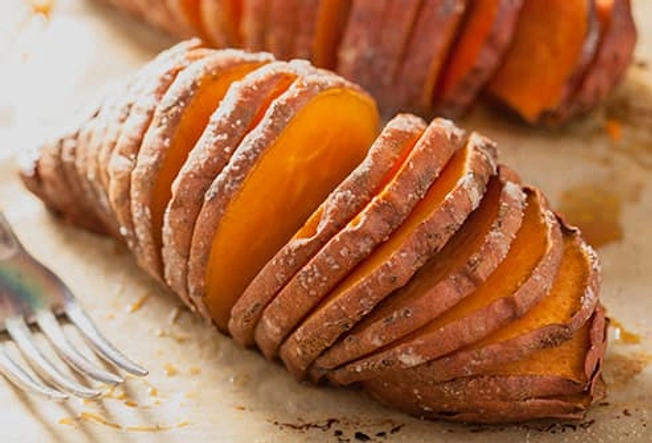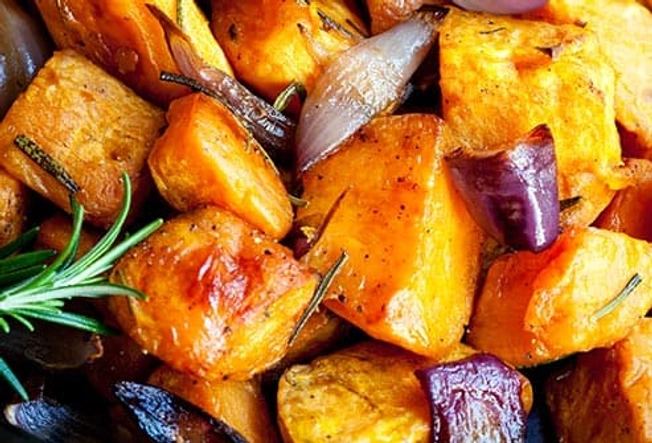Sweet Potatoes: Why You Should Make These Healthy Spuds Your Buds

Antioxidants Aplenty
Not all sweet potatoes are orange. Their skins and insides can be white, yellow, brown, red, pink, and purple. The range of color brings different nutrients to the table. Purple-fleshed sweet potatoes are thought to contain super-high levels of antioxidant and anti-inflammatory agents. As these substances pass through your system, they balance out free radicals -- chemicals that harm your cells.

Vitamin A Victory
Just one medium baked sweet potato can give your body 160% of the recommended vitamin A needed to boost your eye and skin health.

A Beta-Carotene Boost
Deep-orange sweet potatoes contain beta-carotene, an antioxidant thought to fend off illness. This might include certain cancers as well as eye disease.

Healthy Prep Is Easy
The way you cook your sweet potatoes can make a big difference in the nutrition you’ll get from the dish. One study measured how many carotenoids, like beta-carotene, stayed in the food afterward. The simplest method, oven baking, turned out to be the best.

Cancer-Fighting Compounds
Scientists found these colorful spuds have a unique protein called a protease inhibitor. When tested against cancer cells, it appeared to halt some growth.

Vitamins and Minerals
Sweet potatoes are rich in vitamin C, which revs up your immune system. High potassium levels help control blood pressure, while calcium bolsters your bones.

Better for Blood Sugar
White potatoes, the ones you normally eat baked or as french fries, rank high on the glycemic index, which measures how quickly food affects your blood sugar. Sweet potatoes rate lower. They also have more fiber -- about 5 grams in a 3/4 cup serving -- which slows digestion and keeps you feeling fuller longer.

Fabulous Fiber
If you’re trying to trim down, they’re stuffed with filling fiber. For a satisfying meal, bake them in the skin. Or serve them on the side, mashed, roasted, or chopped into a savory stew. White potatoes have their assets -- both tater types are fat-free -- but the sweet ones have slightly fewer calories and carbs.

Iron Man Worthy
Sweet potatoes a good source of iron. That makes them star material for vegetarians and vegans. Here’s why: Meat has heme iron, which your body absorbs more easily than the non-heme type found in fruits, veggies, and nuts. But if you eat foods with lots of vitamin C, like sweet potatoes, your body can absorb the non-heme iron better.

Sweet History
Sweet potatoes often get confused with other veggies. Most often it’s yams. Truth is, they come from a far older family. Sweet potatoes can trace their roots back to prehistoric Ecuador and Peru. Yams, which are native to West Africa and Asia, only date back to 50,000 B.C. They’re rare outside those areas, so that dish labeled yams might really be sweet potatoes.

Year 'Round Goodness
You might link sweet potatoes with holidays like Thanksgiving, when they play a starring role in casseroles and pies. Why limit them to a couple of months when you can enjoy them anytime? Most supermarkets carry raw and canned potatoes all year. You can also find them in newer products like potato chips and frozen fries.
IMAGES PROVIDED BY:
- Getty Images
- Getty Images
- Getty Images
- Getty Images
- Getty Images
- Getty Images
- Getty Images
- Getty Images
- Getty Images
- Getty Images
- Getty Images
SOURCES:
Cleveland Clinic: “White Potatoes Versus Sweet Potatoes: Which are Healthier?”
Mayo Clinic: “Slide show: Add antioxidants to your diet.”
American Academy of Ophthalmology: “What Is Vitamin A Deficiency?”
NC State University: “What is the Difference Between a Sweetpotato and a Yam?”
Library of Congress: “What Is the Difference Between Sweet Potatoes and Yams?”
NC State Plants for Human Health Institute: “Taking Sweet Potatoes Beyond the Thanksgiving Feast.”
USDA: “National Nutrient Database: Sweet Potato.”
National Cancer Institute: “Antioxidants and Cancer Prevention.”
Johnson, E.J. Nutrition In Clinical Care, March-April 2002.
Vimala, B. Journal of Food Science and Technology, August 2011.
Li, P.G. World Journal of Gastroenterology, June 7, 2013.
USDA: “Household USDA Food Fact Sheet: Sweet Potatoes, Fresh.”
NIH: Office of Dietary Supplements: “Vitamin E.”
National Kidney Foundation: “Potassium and Your CKD Diet.”
American Heart Association: “Potassium and High Blood Pressure.”
Asif, M. Journal of Education and Health Promotion, 2014.
Harvard Health Publications: “Glycemic index and glycemic load for 100+ foods.”
American Red Cross: “Iron-Rich Foods.”
LSU Ag Center: “Sweet Potato Quick Facts.”
